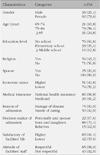Abstract
Purpose
The purpose of this study was to identify factors which predict depression in resdents of geriatric medical and welfare facilities in metropolitan areas.
Methods
The participants were 125 elderly people who resided in geriatric medical and welfare facilities. A structured questionnaires was used to collect data during the period from Sept. 28 to Oct. 23, 2009, and data were analyzed using descriptive statistics, t-test, ANOVA, Pearson correlation coefficients, and Stepwise Multiple Regression with the SPSS/WIN 15.0 program.
Results
The mean score per item for perceived health status was 2.6, and the mean depression score was 3.40. Depression showed a negative correlation with perceived health status (r=-.44, p<.001). Variables that predicted depression were perceived health status, perceived economic status, and attitude of staff towards the elders (33.6%).
Figures and Tables
References
1. Aldwin CM, Sutton , Chinana G, Avron S. Aged difference in stress, coping, and appraisal: Findings from the Normative Aging Study. J Gerontol B Psychol Sci Soc Sci. 1996; 51(4):179–188.
2. An JY, Tak YR. Depressive symptoms and related risk factors in old and oldest-old elderly people with arthritis. J Korean Acad Nurs. 2009; 39:72–83.

3. Bae JY. Structural equational modeling for elderly suicidal thoughts. Daejeon: Daejeon University;2004. Unpublished doctoral dissertation.
4. Choi SH, Yang HW. Mental health of the Korean elderly and the Japanese elderly in institutions: Focused on depression and stress. J Korean Gerontol Soc. 2004; 24:129–147.
5. Chow ES, Hei Kong BM, Po Wong MT, Draper B, Lin KL, Ho SK, Wong CP. The prevalence of depressive symptoms among elderly Chinese private nursing home residents in Hong Kong. Int J Geriatr Psychiatry. 2004; 19:734–740.

6. Chung SD. A path analysis on depression among the elderly of institutional settings. J Korean Gerontol Soc. 2005; 25:75–90.
7. Hosseinian M, Tagharrobi Z, Sharifi KH, Sooky Z, Esalat MS. Depression prevalence and its related factors in nursing homes elderly. Eur Psychiatry. 2008; 23(2):S251.

8. Jang MH, Won JS. Association of anger and anger expression, social support, self-esteem, and depression on elderly. J Korean Acad Psychiatr Ment Health Nurs. 2009; 18:259–268.
9. Jongenelis K, Pot AM, Eisses AMH, Beekman ATF, Kluiter H, Ribbe MW. Prevalence and risk indicators of depression in elderly nursing home patients: The AGED study. J Affect Disord. 2004; 83:135–142.

10. Kang HS, Ma EG. The relationship between socialization of welfare facilities for seniors and Life satisfaction & depression of seniors in facilities. J Welf Aged. 2008; 39:303–322.
11. Kang SK. The effects of self-efficacy and social support on the quality of life of the elderly with depression. J Korean Gerontol Soc. 2009; 29:629–643.
12. Korea National Statistical Office. Korean social indicator. 2008. February 15, 2010. fromhttp://kosis.kr/metadata/main.jsp?surv_id=11736&curYear=2008.
13. Kwon YH, Oh YJ. A comparative study on the health status and life satisfaction of elders in charged and free welfare facilities. J Korean Community Health Nurs. 2009; 23:91–100.
14. Lawrence V, Murray J, Banerjee S, Turner S, Sangha K, Byng R, et al. Concepts and causation of depression: A cross-cultural study of the beliefs of older adults. Gerontologist. 2006; 46:23–32.

15. Lawton MP, Moss M, Fulcomer M, Kleban MH. A research and service-oriented multilevel assessment instrument. J Gerontol. 1982; 37:91–99.
16. Lee GE, Bae DI. The predisposing factors of admission and life satisfaction of charged retirement home residents. J Korean Gerontol Soc. 2004; 24:181–192.
17. Lee H, Lee HY, Lee JA. Predictors of facility adaptation in nursing home residents. J Korean Acad Nurs. 2009; 39:177–185.

18. Lee YS, Yang SK, Lee JS. Behavioral aspects of nursing home residents. J Welf Aged. 2000; 9:219–238.
19. Ministry of Government Legislation. Act on elderly welfare. 2007. February 15, 2010. fromhttp://law.go.kr/LSW/lsInfoP.do?lsiSeq=102142#0000.
20. Mozley CG, Challis D, Sutchliffe C, Bagley H, Burns PH, Cordingley L. Psychiatric symptomatology in elderly people admitted nursing and residential homes. J Aging Ment Health. 2000; 4:136–141.

21. Oh KO, Sung EO, Gang MH. Influencing factors on depression in elderly residing in the community. J Korean Acad Psychiatr Ment Health Nurs. 2006; 15:459–466.
22. Park SY. A study on depression, ADL, IADL, and QOL among community-dwelling, low income elderly. J Korean Community Health Nurs. 2009; 23:78–90.
23. Shin SY. The study on the impact of decision-making process on the adjustment of relocation to a nursing home in the elderly. J Welf Aged. 2002; 18:111–129.
24. Stek ML, Gussekloo J, Beekman ATF, Van Tilburg W, Wetendorp RGJ. Prevalence, correlated and recognition of depression in the oldest old: The leiden 85-plus study. J Affect Disord. 2003; 78:193–200.

25. Sung MS. A correlation study on spiritual wellbeing, hope and perceived health status of the elderly. Daegu: Keimyung University;1999. Unpublished master's thesis.
26. Tsai YF, Wong TKS, Tsai HH, Ku YC. Self-worth therapy for depressive symptoms in older nursing home residents. J Adv Nurs. 2008; 64:488–494.

27. Unsar S, Sut N. Depression and health status in elderly hospitalized patients with chronic illness. Arch Gerontol Geriatr. 2009; 50:6–10.

28. Yoo JY, Im BH. A case study of major disease distributions and patterns of depression of the elderly inpatients of geriatric hospital. J Health Soc Sci. 2007; 121:117–135.




 PDF
PDF ePub
ePub Citation
Citation Print
Print







 XML Download
XML Download